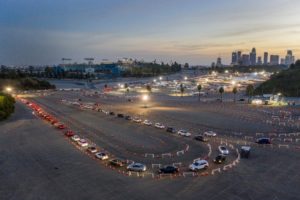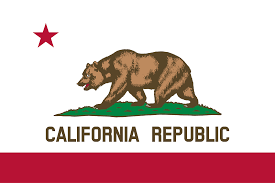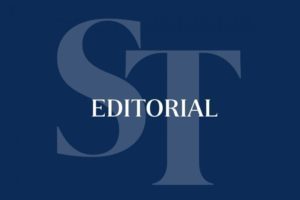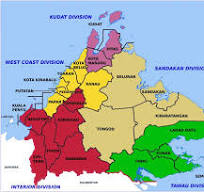| Good morning, and welcome to the Essential California newsletter. It’s Friday, Feb. 12, and I’m writing from Los Angeles.
Last month, Tongo Eisen-Martin was named San Francisco poet laureate. The poet, educator and movement worker is the eighth person to hold the post since Lawrence Ferlinghetti was first appointed to the role in 1998.
Born and raised in the city, Eisen-Martin has described himself and his poetry as “an absolute product of every nook and cranny of San Francisco.” His critically acclaimed second book “Heaven Is All Goodbyes” was published under the acclaimed mantle of City Lights’ Pocket Poets Series. It was awarded the 2018 California Book Award for Poetry.
Eisen-Martin writes with a “style compressed and personal enough to conjure Amiri Baraka, Baudelaire and Bob Kaufman,” as Terrance Hayes put it in the New York Times. His poems are polyphonic symphonies of discursive scenes and scattered dialogue. The exploding kaleidoscope of imagery is at times dissonant and surreal, but his work is very much rooted in this world. This world and its ills.
His are poems that speak to the prison-industrial complex (“somewhere in America / the prison bus is running on time / you are going to want / to lose that job / before the revolution hits”), systemic racism (“This dream requires more condemned Africans / Or (put another way) / State violence rises down”), the deindustrialized American city (“I’m down on my luck / making snow angels / on the abandoned factory loading dock”) and the endless dead-end streets of a rigged game (“the pyramid of corner stores fell on our heads / —we died right away”).
A lifelong activist, Eisen-Martin has taught at detention centers throughout his career. A curriculum he developed on the extrajudicial killing of Black people in the U.S. has been used as an educational and organizing tool across the country, according to the mayor’s office. In speaking about his teaching work, he preaches the power of liberatory education through art. “The power to name the world, to name social realities, to name yourself, to name your position in it” is an underestimated skill, he says.
I spoke to Eisen-Martin about his new role, and the past and future of his ever-changing city. Here’s some of our conversation, condensed and lightly edited for clarity.
I’ve heard you describe your upbringing as “revolutionary.” Can you tell us a little bit about the San Francisco you grew up in?
I think one of the underemphasized victories of the ‘60s movements was a revolutionary kind of cultural stronghold that remained. The landscape of San Francisco was populated by liberated square feet, where I was given a cultural life that centered the African diaspora and revolutionary politics and analysis.
So the white power structure never seemed that big and bad to us growing up. This kind of radical landscape gave us a mental, almost spiritual, immune system that would prepare us to deal with the hegemonic reality of the United States, and come out of it with our outlook intact. Really, with our faith in humanity intact.
Were both of your parents activists?
Yeah. My mother more than my father. My father was politicized by my mother.
You were quite literally born in the Mission, right? In an apartment building on Valencia Street?
25th and Valencia.
Do you still recognize the place that the Mission has become?
No. The Mission was turned into what’s really like a corporate campus. … It’s really just a playground for these kind of transient soldiers of the bourgeoisie. We were ripped out of San Francisco. Though this kind of war against nonwhite communities in San Francisco is actually decades old. This attrition comes with grandmothers being forcibly removed from homes by police or sheriffs, it comes with gang injunctions. … It comes with hyper-policing. It’s not just that we lost some kind of economic gain, or we didn’t play our cards right. It was an aggressive liquidation of nonwhite communities.
You launched your first publishing venture last year — a small press “committed to the exploration of liberation.” What kind of work does Black Freighter seek to publish?
Black Freighter Press is a press for Black and brown writers, anti-imperialist writers. We belong to the revolutionary imagination. We are also committed to publishing incarcerated writers.
How do you see your new role as poet laureate?
The San Francisco Library is filled with beautiful, beautiful people working there. The poet laureate station operates out of the library. They’ve been completely open, giving me free rein with any of their resources I can think to use to bring cultural work down into the trenches. At the same time, it’s straightforward equations — teaching workshops, facilitating reading and participating in publications. … It’s a nice stamp, and it does incentivize some people to add some poetry to their diet.
You haven’t been shy about critiquing San Francisco or comparing it to a dystopia. Do you foresee getting any pushback now that you’re an official ambassador of sorts?
No. I have not yet. Maybe I’m in the middle of a honeymoon that I’m not aware of that will perhaps end. But San Francisco does have a radical history. San Francisco always had a revolutionary potential. Regardless of what’s institutionally pronounced, you can’t count out the actual beliefs of the people. Even the people working in the institutions.
Salesforce, San Francisco’s largest private employer, announced earlier this week that most of its employees will be allowed to permanently work remotely at least part of the time. What do you make of the so-called tech exodus, and how do you see it affecting the future of the city?
If I’m not mistaken, the corporate population of San Francisco has ebbed and flowed before. The tide rises and falls. As long as power is not in the hands of the people, especially nonwhite people, then five or 10 years [from now] we could have a whole new hyper-gentrification. … To me, it’s a matter of power. As long as the corporatocracy maintains the most hegemony in the city, the moves their workforces make don’t matter.
Rent dropped 27% or something like that recently. But a 27% drop in a farcical monthly sum in the first place, what does that really matter? Instead of taking an arm and a leg, they just take a leg? That’s not really going to help nonwhite people, working-class people and those that struggle even more. It doesn’t feel like a new social topography in San Francisco.
And now, here’s what’s happening across California:
Los Angeles schools in more affluent areas move faster to reopen than those in low-income communities: A Times survey of more than 20 school districts throughout Los Angeles County in the past two weeks has found that districts in wealthier, whiter communities are more likely to be moving full steam ahead to reopen elementary schools and have plans in place to welcome students back as soon as permitted — within as little as two weeks if coronavirus infection rates continue to decline. Los Angeles Times
Note: Some of the sites we link to may limit the number of stories you can access without subscribing.
.
Ads by: Memento Maxima Digital Marketing
@[email protected]
SPACE RESERVE FOR ADVERTISEMENT
.
|
L.A. STORIES
More L.A. vaccine troubles: In a day of confusion and frustration, Los Angeles city vaccination sites that were slated to close Friday due to supply shortages ran out of doses sooner than expected and had to turn people away Thursday. Los Angeles Times
Dodger Stadium was one of the five sites (along with Crenshaw Christian Center, San Fernando, Lincoln Park and Hansen Dam) that were scheduled to close Friday but ran out of vaccine on Thursday. (Robert Gauthier / Los Angeles Times)
.
They’re building affordable housing for the homeless — without government help. The goal is to demonstrate how the private sector, in alliance with key nonprofits and the faith community, can build housing for homeless people faster and for less than developers working through traditional government programs. Los Angeles Times
Support our journalism
Subscribe to the Los Angeles Times.
POLITICS AND GOVERNMENT
Impeachment managers wrap up their case, but was it enough? The Constitution requires a vote of two-thirds of senators to convict. That means at least 17 Republicans would need to join all 48 Democrats and the two independents who caucus with them to vote to find Trump guilty. The number of Republican senators open to voting to convict is fewer than half that. Los Angeles Times
[See also: “Five takeaways from Trump’s impeachment trial so far” in the Los Angeles Times]
Even with largely remote work, harassment complaints at the state Capitol continued. “The arm of the California Legislature charged with investigating complaints of harassment, discrimination and retaliation says it received 80 complaints over the past year, at a time when most Capitol employees were working from home.” Sacramento Bee
CRIME AND COURTS
A person of interest in the Kristin Smart cold case was arrested on suspicion of being a felon in possession of a firearm. The San Pedro man taken into custody was the last person to be seen with Smart the night she vanished while walking back to her dorm at Cal Poly San Luis Obispo 24 years ago. Los Angeles Times
[Previously: “A new twist in an enduring cold case” in the Essential California newsletter]
.
Ads by: Memento Maxima Digital Marketing
@[email protected]
SPACE RESERVE FOR ADVERTISEMENT
.
|
HEALTH AND THE ENVIRONMENT
The U.S. could see “open season” on COVID-19 vaccine doses by April, Dr. Anthony Fauci said Thursday, an optimistic forecast that comes as states continue to clamor for additional supplies to ramp up their rollouts. Los Angeles Times
U.S. Coast Guard to enact sweeping safety reforms in wake of deadly boat fire: The changes come in response to the 2019 Labor Day weekend fire aboard the Conception dive boat off the Channel Islands, which killed 34 people and exposed a series of serious flaws in boat safety later detailed by a series of Times reports and an investigation by the National Transportation Safety Board. Los Angeles Times
Robert F. Kennedy Jr. has been barred from Instagram over false coronavirus claims: Facebook, which owns Instagram, said in a statement that they removed the political scion and prominent anti-vaccine activist’s account “for repeatedly sharing debunked claims about the coronavirus or vaccines.” New York Times
CALIFORNIA CULTURE
Lunar New Year in the age of COVID: Red envelopes stuffed with checks, not cash. The pandemic has altered age-old customs, as it has so much else. Los Angeles Times
Workers at digital publishing site Medium announced plans to unionize, becoming the latest group of tech workers to do so. San Francisco Chronicle
A poem to to start your Friday: “Faceless” by Tongo Eisen-Martin. Posit Journal
Free online games
Get our free daily crossword puzzle, sudoku, word search and arcade games in our new game center at latimes.com/games.
CALIFORNIA ALMANAC
Los Angeles: sunny, 70. San Diego: some rain, 61. San Francisco: partly sunny, 57. San Jose: partly sunny, 61. Fresno: sunny, 61. Sacramento: partly sunny, 63.
AND FINALLY
Today’s California memory comes from Adam Lehr:
My dad was a member of the Sheriff’s Mounted Posse. Sometimes throughout the year they would have what they called Family Rides when wives and children were invited for mounted excursions for fun. Back in the early ‘60s, we were able to ride from our home in Hidden Hills all the way down to Malibu Beach through Calabasas, it being pretty much all open. It was a magnificent ride, we all being taken in with the surrounding beauty of Mother Nature.
If you have a memory or story about the Golden State, share it with us. (Please keep your story to 100 words.)
Please let us know what we can do to make this newsletter more useful to you. Send comments, complaints, ideas and unrelated book recommendations to Julia Wick. Follow her on Twitter @Sherlyholmes. |













